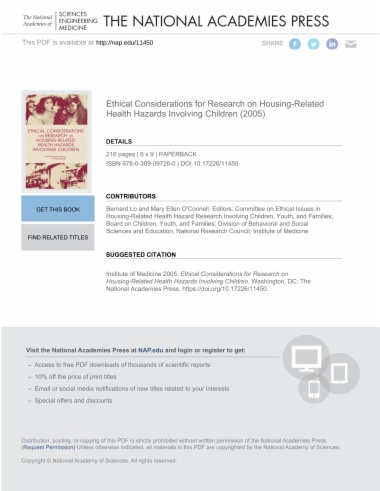Ethical Considerations for Research on Housing-Related Health Hazards Involving Children
explores the ethical issues posed when conducting research designed to identify,
understand, or ameliorate housing-related health hazards among children. Such
research involves children as subjects and is conducted in the home and in communities.
It is often conducted with children in low-income families given the disproportionate
prevalence of housing-related conditions such as lead poisoning, asthma,
and fatal injuries among these children. This book emphasizes five key elements to
address the particular ethical concerns raised by these characteristics: involving the
affected community in the research and responding to their concerns; ensuring that
parents understand the essential elements of the research; adopting uniform federal
guidelines for such research by all sponsors (Subpart D of 45 CFR 46); providing guidance
on key terms in the regulations; and viewing research oversight as a system with
important roles for researchers, IRBs and their research institutions, sponsors and regulators
of research, and the community.
- Cover
- Front Matter
- Executive Summary
- 1 Introduction
- 2 Housing and Health
- 3 Grimes v. Kennedy Krieger Institute: Revisiting the Ethical Issues
- 4 Characteristics of Housing Health Hazards Research
- 5 Community Involvement
- 6 Parental Permission, Consent, and Payment
- 7 Researchers' Responsibilities
- 8 Research Oversight
- References
- Appendix Biographical Sketches of Committee Members and Staff

